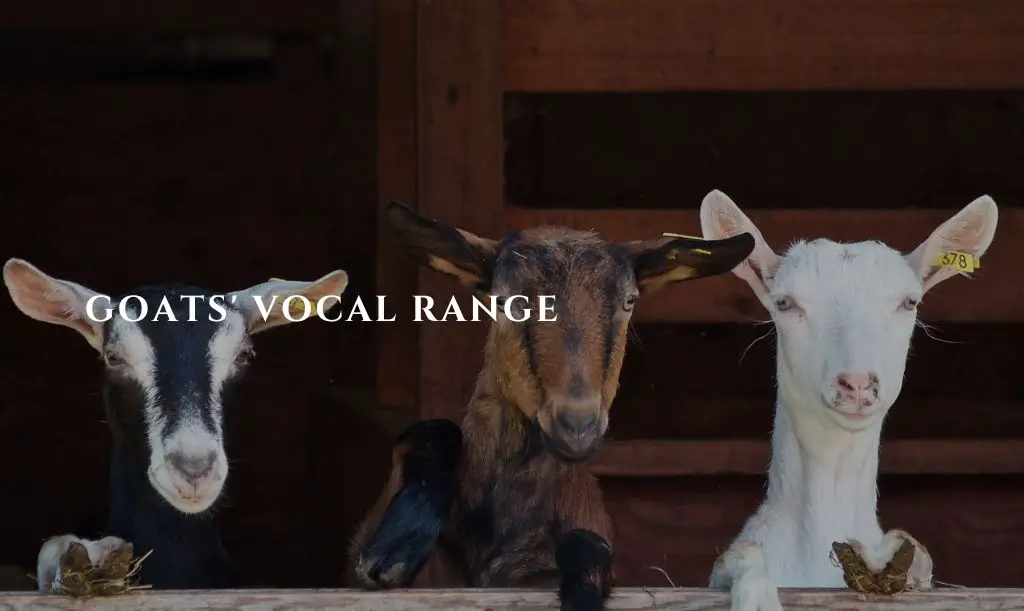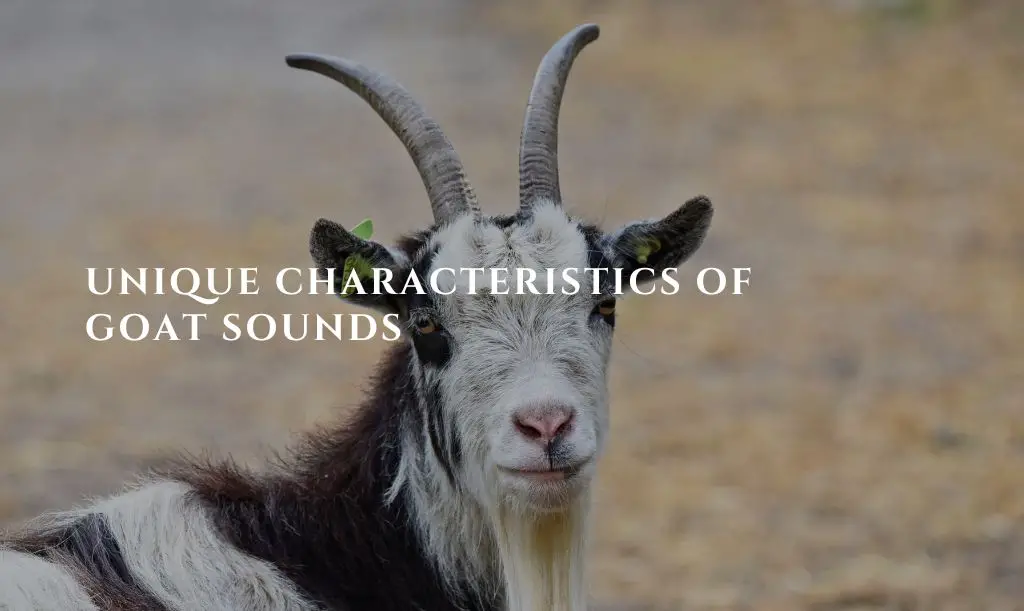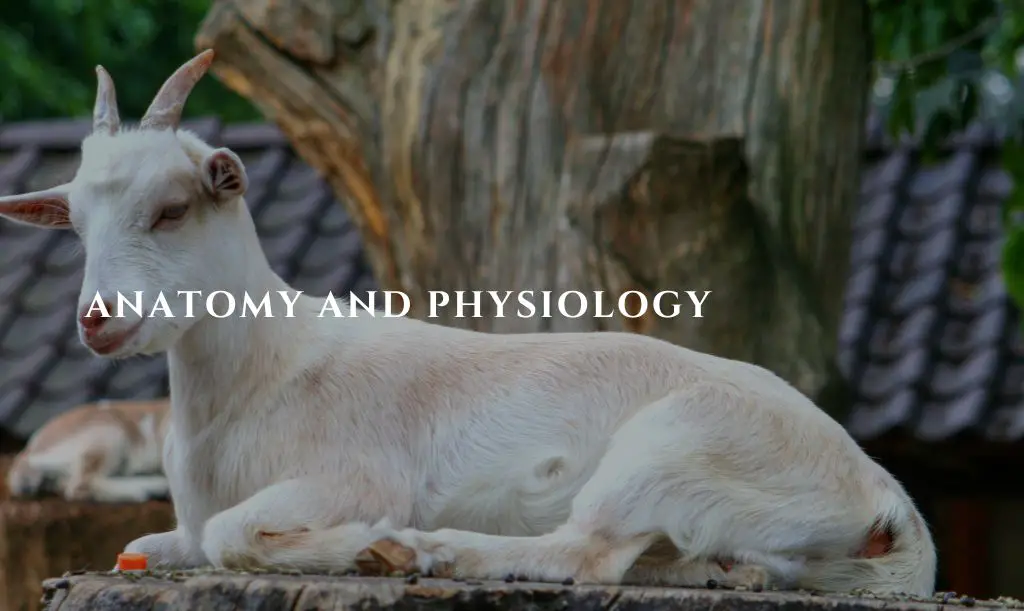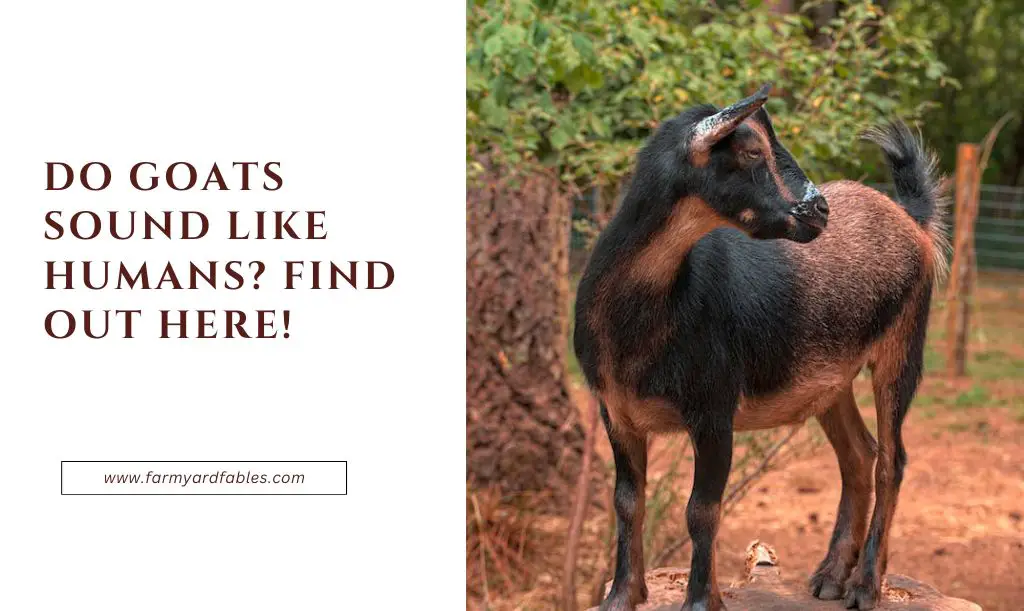Do goats sound like humans?
The notion that goats may sound like humans adds an enchanting layer to our understanding of these charismatic creatures.
While it might be tempting to dismiss this idea outright, numerous anecdotal accounts suggest there might be some truth to it.
Personally, I have heard bleating sounds from my goats that remarkably resemble human voices in pitch and tone.
Moreover, there are instances where goats exhibit unique vocalizations reminiscent of particular human sounds.
Videos featuring “screaming goats” went viral on the internet not too long ago—capturing these hilarious moments when certain goats emit unexpected screams akin to human yells.
And who can forget the enchanting yodel-like sounds of specific goat breeds, playfully showcasing their melodious abilities?
Goats’ Vocal Range

When it comes to vocal communication, goats are surprisingly expressive creatures.
They possess a wide range of sounds that they use to convey various messages.
The bleat is the most familiar and commonly heard sound emitted by goats.
It is their way of expressing themselves in everyday situations. When a goat bleats, it produces a distinctive high-pitched sound that can vary in intensity and duration.
The tone and pitch can be influenced by factors such as age, gender, and individual personality traits.
Some goats have a soft and gentle bleat while others may have a louder and more persistent one.
Similarities Between Goat and Human Sounds
When it comes to analyzing the vocalizations of goats and humans, it’s fascinating to uncover the notable similarities between these two species.
One striking similarity lies in the pitch and tone of their sounds.
Goats, especially when they bleat, can produce high-pitched tones that bear an uncanny resemblance to human voices.
It’s almost as if they have a natural ability to imitate the range of frequencies that we humans are capable of producing with our vocal cords.
High-Pitched Bleats Resembling Human Voices
The high-pitched bleats emitted by goats often catch us off guard because they sound remarkably like a person’s voice, perhaps even echoing the voices we hear daily in our conversations.
This resemblance can be particularly striking when goats emit their bleats in a rhythmic pattern, creating an almost melodic effect that evokes a sense of familiarity with human speech patterns.
While not every goat possesses this distinct tonality, many individuals within various breeds exhibit such pitch similarities.
Goats Can Convey Emotions Through Their Bleating, Similar To Humans
Beyond mere pitch resemblances, goats also possess an impressive ability to convey emotions through their bleating—similar to how we humans use our voices as expressive tools.
Just as we can discern joy from laughter or sadness from sobbing, attentive observers may notice variations in goats’ vocalizations that indicate specific emotional states.
They can express excitement through exuberant trills or communicate distress through prolonged wails that tug at our heartstrings.
This aptitude for emotional expression enhances the connection between goat sounds and human experiences on a deeper level.
There exists a compelling comparative analysis between goat and human vocalizations.
The pitch and tone similarities, with high-pitched bleats resembling human voices, are intriguing.
Additionally, goats exhibit expressive variations in their bleating that allow them to convey emotions, much like humans.
These shared qualities provide a unique bond between our species and create an engaging area of exploration within the realm of sound production and communication.
Unique Characteristics of Goat Sounds

When it comes to making weird and distinctive sounds, some goat breeds take the cake.
These quirky vocalizations have captured the attention of people worldwide, thanks to the wonders of the internet.
While goats are generally known for their classic “bleating” sound, there are a couple of notable exceptions that stand out from the crowd.
Screaming Goats: Videos That Went Viral Showcasing Peculiar Screams
One particular phenomenon that brought goats into the limelight is the infamous “screaming goat” videos.
These clips feature goats emitting an ear-piercing scream that is entirely unexpected from such seemingly innocent creatures.
The screams are often abrupt, loud, and have an uncanny resemblance to a human yelling.
The viral nature of these videos sparked a wave of fascination and amusement among viewers worldwide.
Yodeling Goats: Specific Breed Known For Melodious Yodel-Like Sounds
While screaming goats grabbed attention with their high-pitched shrieks, let’s not forget about the enchanting yodeling goats.
Yes, you read it right!
Certain goat breeds possess a natural talent for producing melodious yodel-like sounds.
This peculiar ability has made them quite popular in certain regions where they are celebrated for their unique vocal talents.
It’s fascinating how these animals can create musical notes resembling human yodeling, echoing through mountainsides as if they were born to serenade us.
These exceptional vocal characteristics exhibited by some goat breeds demonstrate just how diverse and captivating nature can be.
From screaming like humans to harmonizing like skilled singers, these unusual sounds add an extra layer of wonder and amusement to our interactions with these charming creatures.
Anatomy and Physiology: A Comparative Analysis

When exploring the intriguing resemblance between goat and human vocal sounds, it is essential to delve into the realm of anatomy.
The structure and function of the vocal cords play a significant role in producing the distinct sounds we associate with both goats and humans.
Both species possess a similar fundamental anatomy, encompassing vocal folds, muscles, and cartilage that facilitate sound production.
The vocal folds, commonly known as vocal cords, are located within the larynx – a crucial organ responsible for controlling airflow during speech or bleating.
The core mechanism behind sound production in goats and humans operates through vibration of the vocal folds.
When air passes through these structures, they vibrate at varying frequencies depending on their tension and thickness.
This vibration produces sound waves that resonate within the throat, shaping them into distinct pitches and tones.
Differences in Size, Shape, and Resonance
While goats and humans share similarities in their basic anatomical structures for producing sound, there are notable differences that contribute to variations in their voices.
One key difference lies in size; human larynges tend to be larger than those of goats due to differences in overall body size.
Moreover, shape plays a role as well – human larynges have a more elongated structure compared to those of goats.
This variation affects resonance since longer vocal cords produce lower-pitched sounds.
Resonance is another factor contributing to differences between goat bleats and human voices.
Humans possess a complex resonating chamber called the pharynx which enhances the quality of our voices by adding depth and richness.
Goats lack this elaborate structure; hence their bleats often lack this resonance found in human speech.
While there are similarities between goat and human vocal cords regarding basic structure and function – facilitating vibration for sound production – differences in size, shape, and resonance contribute to variations in the sounds each species produces.
These dissimilarities create distinct auditory experiences that differentiate the bleats of goats from the melodic voices of humans.
Do Goats Sound Like Humans? Conclusion
Throughout this article, we have investigated the intriguing question of whether goats sound like humans.
We delved into the vocal range of goats and explored their distinctive bleating sounds and mating calls.
We compared these goat vocalizations to human voices, finding similarities in pitch, tone, and expressive variations.
We also discussed unique characteristic sounds exhibited by certain goat breeds, such as screaming and yodeling goats.
While goats may not precisely sound like humans in every aspect, there are indeed fascinating connections between their vocalizations and our own voices.
Goats can produce high-pitched bleats that bear resemblance to human voices.
They possess a wide range of expressive variations in their sounds, mirroring human emotions to some extent.
Additionally, we examined scientific explanations for these resemblances based on the anatomy and physiology of goat and human vocal cords.
The exploration of whether or not goats sound like humans goes beyond mere curiosity; it highlights our shared experiences with animals in a world brimming with diversity.
While our communication methods may differ greatly from those of goats, it is remarkable how various species find ways to express themselves vocally.
This connection reminds us that despite our differences, we are all part of a beautifully intricate tapestry called life.
Related Articles:
- https://farmyardfables.com/vegetable-oil-for-constipated-goat/
- https://farmyardfables.com/why-do-goats-jump-on-your-back/
FAQs
Do Goats Like Music?
Yes, goats like music. Goats are known for their curiosity, and introducing new elements, including music, into their environment can capture their interest. However, responses may vary among individual goats, and factors such as the volume and type of music should be considered.
- Do Goats Sound Like Humans? Find Out Here! - 22 December 2023
- Vegetable Oil For Constipated Goat (Comprehensive Guide) - 22 December 2023
- Is Bermuda Hay Good For Goats? (Solved!) - 21 December 2023


